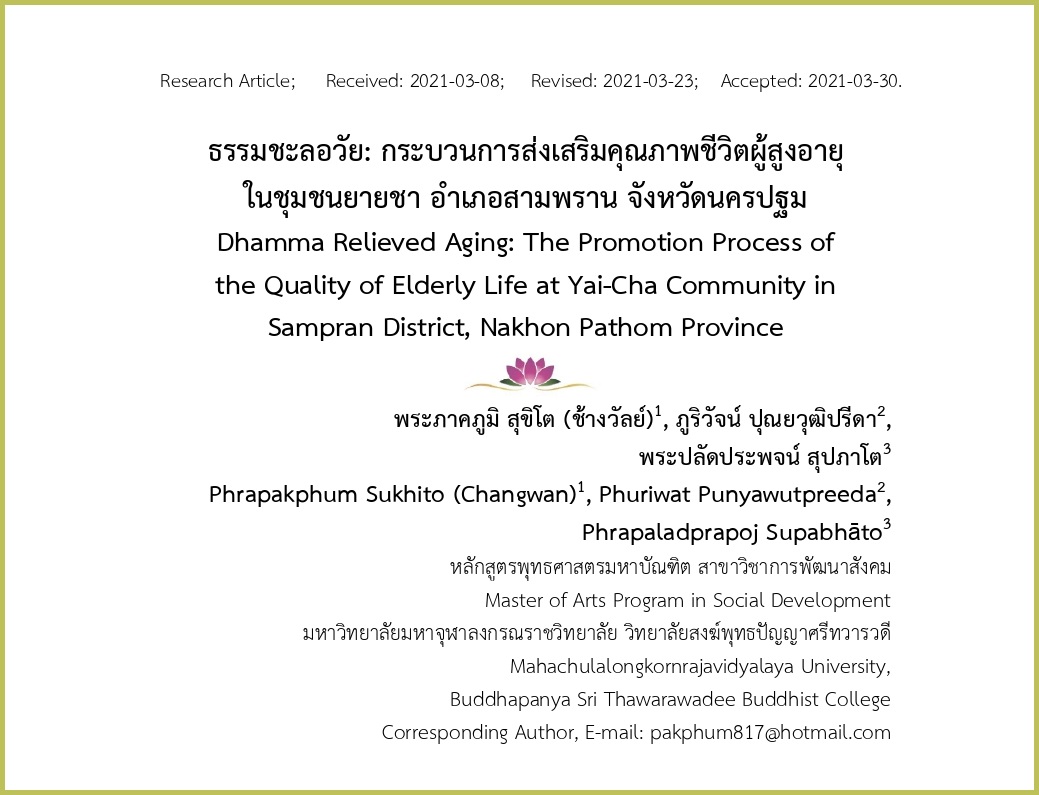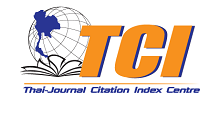ธรรมชะลอวัย: กระบวนการส่งเสริมคุณภาพชีวิตผู้สูงอายุในชุมชนยายชา อำเภอสามพราน จังหวัดนครปฐม
คำสำคัญ:
ธรรมชะลอวัย, กระบวนการส่งเสริม, คุณภาพชีวิตผู้สูงอายุบทคัดย่อ
การวิจัยครั้งนี้มีวัตถุประสงค์ คือ 1. เพื่อศึกษาคุณภาพชีวิตผู้สูงอายุในชุมชน 2. เพื่อพัฒนากระบวนการส่งเสริมคุณภาพชีวิตผู้สูงอายุในชุมชนตามหลักพระพุทธศาสนา 3. เพื่อนำเสนอกระบวนการส่งเสริมคุณภาพชีวิตผู้สูงอายุในชุมชน ตามหลักพระพุทธศาสนา เป็นการวิจัยเชิงสัมภาษณ์เชิงลึก การสนทนากลุ่มเฉพาะ และการสังเกตพฤติกรรมกลุ่มผู้สูงอายุในชุมชนยายชา จากนั้น วิเคราะห์เนื้อหาแล้วเขียนบรรยายเชิงพรรณนา
ผลการวิจัย พบว่า 1. คุณภาพชีวิตผู้สูงอายุในชุมชนยายชามีชีวิตความเป็นอยู่และสุขภาพจิตดี มีความรู้ความเข้าใจสิ่งต่าง ๆ ตามสภาพความเป็นจริงที่เป็นอยู่ในเกณฑ์ดี 2. การพัฒนากระบวนการส่งเสริมคุณภาพชีวิตผู้สูงอายุในชุมชน ด้วยการนำหลักธรรมทางพระพุทธศาสนา คือ ภาวนา 4 และอิทธิบาท 4 มาช่วยในการพัฒนาคุณภาพชีวิตของผู้สูงอายุทั้ง 4 ด้าน 3. กระบวนการส่งเสริมคุณภาพชีวิตผู้สูงอายุในชุมชนยายชา ตามหลักพระพุทธศาสนาพบว่า ผู้สูงอายุในชุมชนร่วมกันทำกิจกรรมแบบมีส่วนร่วม โดยจัดควบคู่กับหลักธรรมและหลักปฏิบัติทางพระพุทธศาสนา องค์ความรู้จากการวิจัย คือ 1. การใช้หลักภาวนา 4 ในกระบวนการพัฒนาควบคู่กับการพัฒนาคุณภาพชีวิตผู้สูงอายุทั้ง 4 ด้าน คือ สุขภาพ สังคม จิตและปัญญา 2. การใช้หลักอิทธิบาท 4 ได้แก่ ฉันทะ วิริยะ จิตตะ วิมังสา 3. การเน้นพัฒนาการของผู้สูงอายุแต่ละกลุ่ม โดยกลุ่มผู้สูงอายุติดสังคมใช้หลักภาวนาครบทั้ง 4 ข้อ กลุ่มผู้สูงอายุติดบ้านใช้หลักภาวนาในข้อกาย จิตและปัญญา กลุ่มผู้สูงอายุติดเตียงใช้หลักภาวนาข้อกายและจิต
Downloads
เอกสารอ้างอิง
คณะกรรมการผู้สูงอายุแห่งชาติ กระทรวงการพัฒนาสังคมและความมั่นคงของมนุษย์. (2557). แผนผู้สูงอายุแห่งชาติ ฉบับที่ 2 (พ.ศ. 2545-2564) ฉบับปรังปรุง ครั้งที่ 1 พ.ศ. 2552. กรุงเทพมหานคร: โรงพิมพ์เทพเพ็ญวานิสย์.
คณะทำงานจัดทำแผนยุทธศาสตร์ผู้สูงอายุจังหวัดนครปฐม. (2558). แผนยุทธศาสตร์ผู้สูงอายุจังหวัดนครปฐม (พ.ศ.2558-2564). นครปฐม: คณะทำงานจัดทำแผนยุทธศาสตร์ผู้สูงอายุจังหวัดนครปฐม.
จันทนา สารแสง. (2561). คุณภาพชีวิตและพฤติกรรมส่งเสริมสุขภาพของผู้สูงอายุ ตำบลทุ่งข้าวพวง อำเภอเชียงดาว จังหวัดเชียงใหม่. วิทยานิพนธ์ปริญญาสาธารณสุขศาสตรมหาบัณฑิต มหาวิทยาลัยราชภัฏเชียงใหม่.
ถวิลวดี บุรีกุล. (2548). การมีส่วนร่วม: แนวคิด ทฤษฎีและกระบวนการ. นนทบุรี: สถาบันพระปกเกล้า.
พระกองสี ญาณธโร (พรมโพธิ์). (2560). ศึกษาวิเคราะห์การดำเนินชีวิตตามหลักภาวนา 4 ในพระพุทธศาสนา. วิทยานิพนธ์ปริญญาพุทธศาสตรมหาบัณฑิต มหาวิทยาลัยมหาจุฬาลงกรณราชวิทยาลัย.
พระครูถาวรสิทธิการ (สรศักดิ์ ฐานกโร). (2561). การประยุกต์ใช้หลักอิทธิบาท 4 ในกระบวนการแปรรูปกลอยของชุมชนบ้านไทรย้อย อำเภอเด่นชัย จังหวัดแพร่. วิทยานิพนธ์ปริญญาพุทธศาสตรมหาบัณฑิต มหาวิทยาลัยมหาจุฬาลงกรณราชวิทยาลัย.
พระธนพล กนฺตสีโล (เรือนเพ็ชร์) และคณะ. (2561). การส่งเสริมคุณภาพชีวิตผู้สูงอายุของเทศบาลตำบลเทพกระษัตรี อำเภอถลาง จังหวัดภูเก็ต. วารสารมหาจุฬานาครทรรศน์. 5 (3), 943-954.
ละออม สร้อยแสง และคณะ. (2557). การศึกษาแนวทางการป้องกันการหกล้มในผู้สูงอายุ ชุมชนมิตรภาพพัฒนา. วารสารพยาบาลทหารบก. 15 (1), 122-129.
วิภาพร สิทธิสาตร์ และสุชาดา สวนนุ่ม. (2550). พฤติกรรมส่งเสริมสุขภาพของผู้สูงอายุในชุมชนเขตความรับผิดชอบของสถานีอนามัยบ้านเสาหิน ตำบลวัดพริก อำเภอเมือง จังหวัดพิษณุโลก. รายงานการวิจัย. วิทยาลัยพยาบาล บรมราชชนนี พุทธชินราช สถาบันพระบรมราชชนก สำนักงานปลัดกระทรวงสาธารณสุข.
ศิริพันธ์ ถาวรทวีวงษ์. (2543). ประชากรศาสตร์. กรุงเทพมหานคร: มหาวิทยาลัยรามคำแหง.
สมเด็จพระพุทธโฆษาจารย์ (ป.อ. ปยุตฺโต). (2561). พจนานุกรมพุทธศาสตร์ ฉบับประมวลธรรม, พิมพ์ครั้งที่ 41. กรุงเทพมหานคร: ผลิธัมม์.
สมโภช รติโอฬาร. (31 มีนาคม 2556). การจัดสิ่งแวดล้อมที่เอื้อต่อสุขภาพผู้สูงอายุ. สืบค้นเมื่อ 5 มีนาคม 2564, จาก https://www.stou.ac.th/schools/shs/booklet/book56_2/pbhealth.htm






